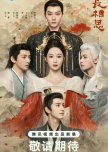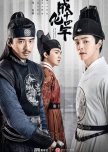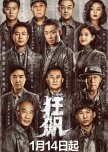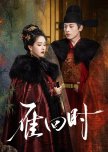
The Return of the King.
After closing Season 1 on a high note, the much anticipated Season 2 of Lost You Forever opens with an air of looming inevitability. The focus shifts from Xiaoyao to Cangxuan as the main plot is built around the return of the king who is meant to unite Dahuang. This also portends the end of the long stalemate between Xiyan and the Chenrong remnants. This kind of endgame puts all of the main characters at crossroads with difficult, heart wrenching choices to make.Season 2 has not been as well received as Season 1 and the bulk of the disappointment is around how unlike Season 1, Season 2 deviates from the novel on a few fronts. I didn't read the novel so I can only evaluate the drama on its own merits. From my perspective, the season's biggest weakness is that the plot arcs leave a rushed, condensed impression. This shouldn't be a surprise as topics involving conquering harmless neighbouring states and glorifying rebels don't fare well with Chinese censors. I also had to scoff at the idea of a war with no civilian casualties; if this were a plot driven story I would be quite disappointed.
But Lost You Forever is predominantly a character story and on that front, the character arcs deliver in spades. Even though many characters make choices that are not relatable, they are not meant to be. Novelist Tong Hua designed the characters for both the prequel novel Once Promised and Lost You Forever based of mythical creatures from Shānhǎijīng/山海经, The Classic of Mountains and Seas. This is an ancient Chinese geographic compilation of mythical monsters and magical creatures; kind of like Hogwart's Monster Book of Monsters. This story is set at the beginning of time, after Pangu and Nuwa created the world. Xiangliu is a mythical beast, a venomous nine-headed snake monster loyal to water deity Gonggong. Cangxuan and Xiaoyao's grandfather the Xiyan King is none other than Huangdi/黃帝, the legendary Yellow Emperor. They are early immortals, directly descended from primordial gods whose footprints can still be found in the shape of the mountains and seas. They live for an unfathomably long time; until their obsessions eventually get the better of them. This explains Cangxuan's darkening and Xiaoyao's overpowering fear of loneliness and abandonment.
Even though this story broke my heart, all of the important characters are true to themselves and fulfil their destiny. I did not always agree with or like their decisions but the storytelling is elevated by phenomenal acting that compelled me to understand their choices and accept that their decisions made sense for them. My only disappointment with the season is that plot-wise it sagged and is not strong enough for me to raise my rating for the drama overall to a 9.5/10.0. It is nonetheless an immersive, heart-rending and dark enchanted fairytale about flawed but unforgettable characters who are trapped by destiny. I rate both the second season and the adaptation in its entirety 9.0/10.0. Watch it but guard your heart and do not grieve too hard for them because their fates are to a large extent predestined.
SPOILER WARNING
The rest of this review does not avoid spoilers and is best read after you have finished watching this drama in its entirety.
I may be in the minority but even though I almost drowned myself in wine, I think the ending is perfect and fitting. Xiaoyao is a flawed and broken character that regresses as the narrative advances. Her strongest, happiest, moments were in Qingshui Town, when she lived among mortals as Wen Xiaoliu. The only thing she lacked was a companion. When Ye Shiqi, another lost immortal came along, her life was complete. Even though Tushan Jing is a weak character that let Xiaoyao down repeatedly, he is kind and when it mattered, he was willing to be Ye Shiqi again so that she could be Wen Xiaoliu again. He was the safe choice and the only choice Xiaoyao was capable of making. Even though I will never like it, I understand it and I can live with it. The best, most magical arc was always the Qingshui Town arc so the drama closes there, in a full circle.
Cangxuan is also a damaged and abandoned character whose his mother chose to die with his father over living for him. Thus Xiaoyao and Cangxuan share a deep and complex bond that goes beyond their childhood oath. From the get go, the way they deal with their shared trauma put them on forever opposite paths; he chose to be invincible while she chose to be invisible. Xiaoyao only reclaims her identity and returns to the perilous world that cost her everything because of her promise to Cangxuan. She faces her demons, relives the worst days of her life and puts herself in harm's way to be his pawn; the princess bride that paves his way to the throne. She never looks happy or carefree again after she becomes Xiaoyao.
The great irony in their story is that Cangxuan seeks power to protect Xiaoyao but once he attains power, he becomes the greatest threat to her. He is Xiaoyao's hero that lived long enough to see himself become a villain. Had Cangxuan given in to his worst instincts, it would have been unforgivable and it would have destroyed them both. I am relieved the drama only showed us what would have happened and then walked him back from the brink. Cangxuan did many regrettable things along the way, which he describes as 遗憾/yíhàn and not 后悔/hòuhuǐ. This means he did what he had to do; that he did not really have free will. The turning point in his character is when he admits there was one pivotal moment he regrets (后悔/hòuhuǐ); when he should have chosen Xiaoyao but he chose the throne instead. But even after he owns his choices, I feel a frisson of fear at his disarming smile that is belied by the dark longing expression in his eyes. Xiaoyao will never be truly safe from him so Xiling Jiuyao disappears among those who die collecting and documenting rare herbs throughout Dahuang.
A'Nian is the best character in this story. She is the spoiled but brave and true Haoling princess who grew up with the security of a loving family and her beloved Cangxuan gege. She is who Xiaoyao should have been and she is living Xiaoyao's best life. She dares to put herself out there, to take risk in love without needing to be loved in return. I hope one day Cangxuan understands that Xiaoyao did choose him; that her name is A'Nian.
As for Xiangliu, he understood Xiaoyao best and loved her most selflessly. But by the time they met, he had long ago pledged all nine lives to his lost cause. After leading so many men to fight to the death, it is not clear Xiangliu could have just walked away even if Xiaoyao asked him to. It would have been a risky, reckless and consequential path for both of them; the story of Chi Chen and Xiling Heng could repeat itself. Xiangliu and Xiaoyao waited for each other to cross the line for a very long time; far longer than Xiaoyao waited for Tushan Jing. But the inescapable truth is after everything she went through, Xiaoyao is too broken. As the consequence of two people who loved recklessly; she could only choose to be loved. Xiangliu is himself not free either so he accepts this. For him their brief entanglement had to be enough. If Xiaoyao had been A'Nian, she would have dared to choose him except his path would have never crossed with that A'Nian, only Xiaoyao. They were just never meant to be. And so Xiangliu frees her from missing him forever and leaves her with someone to rely on and go home to. Even though she will never be burdened by knowing the full extent of everything he did for her, Xiaoyao grieved deeply for Xiangliu. To me, her silent, helpless adult tears were far worse than the way she child ugly cried for her parents. I do wish he had left her the real Chubby but I guess it was not possible since Chubby would have gobbled up Tushan Jiing and spat out his entrails.
Even though both Zhang Wanyi and Yang Zi deliver outstanding and compelling performances, Tan Jianci's portrayal of Xiang Liu is simply iconic. I can't remember when I was last so mesmerized by a character. Even though it shattered me, Xiangliu fulfils his destiny in an epic, climatic ending that is what legends are made of. According to Shānhǎijīng, Xiangliu left behind a patch of earth so toxic that nothing grew or lived there again. I know book readers are not satisfied with the ending but for me it is an incredibly sad but beautiful and fitting way to end a story about love that is not a love story. My only regret is I didn't get to see Xiaoyao shoot Xinyue in the heart. I mean to make time to read both the prequel and the novel so I won't spoil myself the book ending. But if it is at least this good, then I love it already.
X
Was this review helpful to you?

Despicable Me.
This sublime wuxia revolves around two atypical protagonists and their scorching, profound connection. A bold BL adaption that makes no attempt to suggest the relationship is just a bromance, the love story is so charismatically portrayed that it will captivate even mainstream viewers. Both protagonists are morally ambiguous and flawed characters with their own code of conduct. They fall far short of conventional da xia/大侠 or martial heroes but still manage to beguile us into caring and rooting for them.What elevates this drama is the scriptwriting , the writer put her heart into this and while I cannot compare it with the book, I couldn't be more satisfied with the drama's storytelling. Important plot and character points are planned and planted well in advance and the story unfolds in a way that pulls us into various the plot threads and the partial reveals. Many questions, including when Zhou Zishu recognizes Wen Kexing; are never clearly answered but can be surmised upon re-watch from hints in the dialogue and the characters' subsequent actions. The playful, flirtatious dialogue heavily laced with double entendre and layers of meaning with its facile parlance of idioms and ancient parables has won widespread praise from educators and broad audiences, inspiring young adults to dust off their classical texts with renewed enthusiasm. This winsome first work of a young scriptwriter sets a high bar for historical dramas going forward and puts the often lazy and tired works of more experienced writers to shame.
At surface, the backdrop and many characters are classic wuxia themes and anachronisms - various jianghu sects are vying to recover five shards of liulijia, a glazed artefact that can unlock a hidden repository of the most elite martial arts and miraculous medical manuscripts. Sound familiar? Its been done many times. But it scarcely matters because the two main protagonists, Zhou Zishu and Wen Kexing immediately sweep us away with their outrageous, titillating courtship. Gong Jun's shamelessly flirtatious Wen Kexing, is the most predatory, lecherous, and utterly delicious display of physical attraction I have seen since John Malkovich's iconic Valmont in Dangerous Liaisons. I am quite certain most of Zhang Zehan's eye rolls were not acting and I just love his improvised comment - even my fart smells good! Both actors deliver immersive resonating performances - Gong Jun with a wild vengeful ferocity behind flashes of vulnerability and Zhang Zhehan with a subtle nuanced complexity that hints at a multitude of emotions within micro expressions. Classic wuxia themes and archetypes are woven into an addictive tale of friendship, love, betrayal, loyalty, ambition, sacrifice and of course revenge.
While a bit heavy on the slow motion, the fight scenes are stunningly choreographed and delivers enough hairy, scary, dicey, slicey moments to have me at the edge of my seat. I was stunned by the raw ferocious rage and naked hatred that spilled out of Gu Xiang in the epic finale. The bloodthirsty, brutally lethal and absolutely berserk final mortal battle where the master of the Ghost Valley emits rage with the wild light of cruel insanity flashing in his eyes is without doubt the highlight of the action. This of course excludes Lao Wen and Ah Xu's exuberant fight scenes because everybody knows its really a mating dance where they are actually just ogling at each other. The story is well paced with a good balance of mystery, action and and ends spectacularly with enough twists, surprises and a breathless cruelty that pays homage to the true spirit of the genre. If I have to find fault, there are too many sects and side characters that don't advance the plot. The relationship between Zhao Jing and Scorpion King also feels off in a creepy way and even though the role is very well acted, Scorpion King's motives are not well developed. In general the villains feel rather two dimensional but perhaps this is unavoidable given how grey and complex both protagonists are.
Even though this is hands down one of the best wuxias I have seen in years, this is more of a character drama in the sense that the core characters are what really brings this story life in a differentiated way. I am going to discuss them in greater detail in the following paragraphs. Be warned there are mild spoilers so you may want to stop reading here and revisit after completing.
*Be warned - mild spoilers ahead!*
The narrator Zhou Zishu is a dark character and while he is not a villain, he is amoral and thus the story is told via the lens of a world view that is defined by personal loyalties and relationships rather than some over arching sense of morality. In Zhang Zhehan's own words, Zhou Zishu has thousands of layers and is thus the most fascinating and difficult character to both write and to portray. In this both writer and actor delivered brilliantly in striking that perfect balance of revealing not too much but just enough to create an enigmatic character with insidious lingering impact. Zishu is a cynical and disillusioned cold hearted assassin who is only bound to and motivated by his word of honor - yes for once we have an aptly titled c-drama. He doesn't blame Jin wang for his fall from grace nor does he try to avenge his fallen sect brothers because like himself, they all must live and die by their oath, their word of honor. By the time he encounters Zhang Chengling and Wen Kexing, he is resigned to his self inflicted fate and means to spend his remaining days wandering the world drinking himself into oblivion. He epitomizes despicable me, stricken by self loathing for his weaknesses, for his failings that led to the deaths of his sect brothers and Four Seasons Manor's downfall.
Zishu is pulled back into the world of the living by his promise to see Chengling to safety - his intent is to do no more than that and is indifferent to the boy's pleas to accept him as his disciple. Although he was attracted to Kexing, he dismisses his outrageous overtures and distrusts him but lets him stick around to keep an eye on him. It is only after Kexing hallucinates and calls him Zhou Zishu that his attitude changes. That must be when he suspects who Kexing is and for the first time, sees a path towards keeping his promise to his shifu by resurrecting Four Seasons Manor and thus he accepts Chengling as his disciple. But he is really only putting his affairs in order so to speak. Even though he acknowledges Kexing as his soul mate, he does not deem himself worthy of a long and happy life.
Wen Kexing on the other hand is innately a good person, who is driven by hate and vengeance into doing some terrible things. Unlike Zishu, he still longs to be a good person and deep down still believes he is indeed a good person. While Gong Jun brings the many facets of Wen Kexing from the terrifying to the vulnerable alive vividly with his expressive eyes, the character itself is a more easily understandable, angsty, revenge driven wuxia archetype. Zishu is a much darker character than Kexing and he does not save or redeem Kexing, it is actually the other way around. Although Kexing at surface gets more screen time, as the narrator that always seems to know more than he reveals, Zishu is omnipresent and invites the most mind share. As they change each other and extend their found family to include Chengling, Gu Xiang, Cao Weining and even the irascible and hilarious Ye Bai Yi, Zishu subtly comes to embrace life again.
This drama peaks spectacularly in the gorgeously shot penultimate episode that has everything - clever final reveals, plot twists, shocking, shattering losses, violent clashes and epic showdowns. I screamed, I jumped up and down, I cried, I couldn't believe my eyes! This is the way a drama should end, at its peak. Yes, there are small loose threads but overall, I am very happy with the ending. True, the final afterthought episode is a bit of a non sequitur but everything else was so spectacular I am willing to not look that hard at it. This is by far the best wuxia I have seen in many, many years and I can happily call this a perfect 9.5.
Was this review helpful to you?

One that loved not wisely but too well.
Once upon a time in Beili, there lived a woman who was simply too beautiful 倾国倾城/qīng guó qīngchéng; she could fell a city with one look and fell a kingdom with a second look. This kind of woman is a menace to mankind that can only be locked out of sight in a gilded cage. This is the cautionary tale of a brave man, one that loved not wisely but too well who dared to set her free. And his one true friend who tried to help him do the right thing.Dashing Youth 少年白马醉春风 or Young White Horse Drunk in the Spring Breeze is the highly anticipated prequel to 2022's dark horse hit high fantasy martial arts drama The Blood of Youth 少年哥行. Like its predecessor, it is a youthful coming of age story about friendship, adventure and the spirited idealism of youth. Even though Baili Dongjun is the titular character, it is equally his best friend Ye Yun's villain origin story. They are parallel characters; both innate martial artists and scions of the Beili empire's founding families. As boys, they vowed to storm the martial world together when they grew up; Yun as the Sword Deity and Dongjun as the Liquor Deity. After the Ye family's downfall, they are destined to go down opposite paths. Dongjun lives a charmed life; making a name for himself as Li Changsheng's final disciple at the prestigious Jixia Academy; surrounded by new friends like Sikong Changfeng and Beili's Eight Talented Gentlemen. He reunites briefly with Ye Yun, who now calls himself Ye Dingzhi. In sharp contrast, Ye Dingzhi's path is a lonely one, full of obstacles, inequities, betrayals and brief snatches of happiness.
At its core, this is quite a straightforward story that is cluttered in the storytelling. There are too many digressions into the Who's Who of the martial world and and its pretentious rankings. While the fan service is terrific, such a dazzling array of too hot to handle swordsmen put my exploding ovaries in danger of apoplexy. The surfeit of hot filler characters with shallow side stories distract from the main arcs. For all their fancy swords and pompous rankings, all we see are a few showy poses and twirls before the CGI takes over and screen explodes in a gory orgy of light and digital creatures. While the CGI is well done, it is a big let-down not to see a few well choreographed live action fight sequences.
I was happy to see Hou Minghao dub himself as Baili Dongjun. It makes a big difference in how the character comes to life. While his acting is still a work in progress, he plays a character he can relate to and it shows. Ye Dingzhi is a more complex and intense role, one that He Yu pulls off charismatically. Even though he does questionable things, I empathized with him every step of the way. It would have been nice to see more of Xia Zhiguang's Sikong Changfeng. The humor and camaraderie between all the dashing youths is one of the drama's highlights. Even though the romances are not convincingly written or well developed, I liked all of the couples enough to root for them. The role of Yi Wenjun should have been more sympathetically portrayed instead of just as helpless, selfish and willful. The lovely Ye Yao is only Dongjun's muse, her character doesn't get to do much.
The irreverent Li Changsheng/Nangong Chunshui is the funniest, best acted and most engaging character in this story. Even though his arcs don't tie well with the main plot, the narrative visibly sags after his exit. His parting words to his disciples 凭心而动/píng xīn ér dòng or "act according to your heart" captures the spirit and idealism of youth that is Dongjun's lifelong mantra; one that years later, he passes on to his disciple Tang Lian. He helps Dingzhi steal the bride because Wenjun was not willing and therefor it is wrong to force her. It is the simple, absolute truth that trumps the cynical calculations driven by politics and expedience. He never wavers from this belief. It is true that Wenjun is a selfish, weak and dislikable character who makes terrible decisions with devastating consequences. But she was still wronged in the first place. Thus like Dongjun, I understood, even tried to empathize with her until she was too easily manipulated into returning to Tianqi. That was not only a stupid decision, it showed that she simply did not trust and love Dingzhi enough to wait for him. Poor Dingzhi, he never got any breaks. Even the love of his life failed him at the end. Through sick and sin, it was always and only Dongjun who remained his one true friend.
There is little new in the political plot that wasn't revealed in dialogue and flashbacks in TBOY. Which would be fine if they fleshed out the character stories and the succession struggle instead. But those are dealt with cursorily with Ruojin left as a blank cartoon character and the relationship between the brothers not explored. TBOY romanticizes Prince Langya as a tragic hero, the noble uncrowned king of Beili. In this prequel, he is the character that disappointed me most. He tore up his father's will out of misplaced loyalty and his own selfish desire to live an unrestrained life. He never made the case for why Ruojin was more worthy, supported him unconditionally and in the case of Wenjun, enabled him even though he knew it was wrong. There was never a so called greater good or do or die reason why Wenjun had to marry Ruojin, it was simply a matter of imperial privilege and entitlement. They could have escaped with his help and everything could have been so different. But I don't hold him solely responsible; there were so many malign forces at play and bad decisions that there is plenty of blame to go around.
The ending to this story leaves that bitter after taste that the bad guys won. It makes too convincing a case that a too beautiful woman who can topple kingdoms must be safely locked out of sight so she can do no harm. Both Wenjun and Dingzhi paid a high price for their mistakes but too many people who pushed Dingzhi down the dark path got off unscathed. In the novel, Dongjun has an epiphany about his own dào/道 or convictions in the middle of his fight with Dingzhi. He switches sides and punches the daylights out of the emperor instead. He scolds him: "She does not like you, why force her to marry you? She has escaped and is living a happy life, why lock her up again? You are the emperor with a harem of 3000. My brother only loves one person. Live and let live. Learn from your brother, he can even let you have the throne, why can't you let my brother have one wife?" Even though it changed nothing it was something that had to be said. Without this scene, Ruojin is never called out or held accountable for his role in starting a war over a woman. Instead it is Dingzhi who is destroyed and villainized for trying to hold on to a grass hut in a tiny corner of the world where he was happy. It is very hard to feel good about a story that ends like this.
This messy and disappointing prequel was in some ways limited by what was already canon in TBOY but still could have been better on multiple fronts, Nonetheless it is a chock full of eye candy and a fun watch if you don't look too hard at it and ignore the inconsistencies with TBOY. Even though this is a critical review I enjoyed the drama. I am just mad because it had the potential to be almost as good as TBOY. But it wasn't and so I can only rate this 8/10. I am still happy to recommend it , especially if you loved TBOY. If you liked Wuxin before, you will love him more after knowing his parent's story.
Was this review helpful to you?

The cook, the eunuch and the chowhound - a crime solving menage a trois.
This comedic drama features a wildly imaginative yet oddly fitting crime fighting menage a trois comprising of a low (sixth) ranked magistrate (Tang Fan), a high-ranked embroidered guard (jingyi wei; Sui Zhou) and an influential eunuch (Wang Zhi) with the emperor's ear. Their paths intersect on cases with national security implications and while they have different agendas and masters, their synergistic and mutually beneficial collaborations blossom into friendship. The three main characters are well written - their bromance, hilarious antics and interactions are this drama's greatest strength.With an irrepressible grin and a wicked gleam in his eyes, Darren Chen really hams it up with his cheeky, flirtatious and sometimes deliberately irritating characterisation of the titular Tang Fan, an idealistic young magistrate who is more of a chowhound than a sleuthhound. The talented and willowy Tang Fan is a very pretty boy with delicate and vivacious features who embraces his feminine side with abandon and is passionate, emotional, naggy, petulant, petty and vengeful. This outrageously funny character writes erotic novels to supplement his puny income, lives to eat, seems extremely well acquainted with the how to but yet can't cook to save his life. He happily moves in with the gorgeously taciturn, moody, much more masculine and deadly Sui Zhou who steals Tang Fan's heart with his ability to cook a mean meal. There is enough in their interactions and suggestive domestic arrangement to get the BL fans all hot and bothered without running afoul of Chinese censorship. And then of course there is Wang Zhi, the most morally grey and dangerous of the three. He approaches relationships transaction ally - "you scratch my back I'll scratch yours" and is unambiguous about his first loyalty to king and country. Newcomer Liu Yaoyuan's portrayal of the ruthless, calculating and yet inexplicably likable Wang Zhi nicely rounds out this kinky threesome. Between them, they are able to marshal resources from the lowest to highest reaches of society to solve their cases.
Set at the heart of the capital during the Chenghua reign of Ming Dynasty, the important characters and events of the period are nicely tied into the overall plot-lines. The surrounding characters were somewhat cliche but mostly well done from the "adopted daughter" Dong'er, the miracle doctor, the Oirats, Wang Zhi's beggar informants and the rare treat of a smart and hot emperor. The cases run the gamut from crimes of passion, corruption, larceny, terrorism and climaxes in a dangerous conspiracy reaching the highest ranks of government. Most surrounding characters including the villains have recurring roles in subsequent cases which gives them dimension and avoids the confusion of excessive character introductions with each new case. The cases shouldn't be taken too seriously; while they are fun and quite interesting, they are not that original or that difficult to solve and have some logic holes and are thus unlikely to satisfy a serious crime or mystery buff. The rhythm of the investigations frequently digress into inane and somewhat childish hit or miss comedic sketches that can go on for too long. There is a slight misogynist undertone to this drama - even the likable women have unflattering traits (stupid, noisy, whiny, irrational), or worse are power hungry, traitors, extremists or come to a bad end.
The tightly choreographed action scenes are signature Jackie Chan - lethal, gripping, high impact, extremely acrobatic and fluid poetry in motion. They are not excessive, do not drag on for too long and avoid the mid-combat slapstick moments he used to be so fond of; all good changes. The camerawork is stunning and very artistic, approaching movie quality. They obviously spared no expense with this and it shows.
For those who grew up on Jackie Chan, the Sleuth of Ming Dynasty is a fun romp down memory lane. There is a bit of the artistic Jackie Chan, the wacky whack-y Jackie Chan, the comedic Jackie Chan, the high testosterone Jackie Chan, the innovative Jackie Chan, the crass Jackie Chan and finally and pleasingly, the mature Jackie Chan. I outgrew his flicks ages ago - after awhile I found the hair rising stunts, high speed chases and exaggerated comedic routines repetitive, shallow and draining. So I am pleasantly surprised to see in this drama that maturity has toned down and balanced some (not all) of his more extreme inclinations while still remaining essentially Jackie Chan. It is also nice to see the uniquely Jackie Chan inspired Hong Kong wu da pan (武打片) sub-genre with its chauvinistic, contradictory, cynical, sarcastic yet sentimental and idealistic spirit has evolved for the better but is still innately the same.
This is highly entertaining and enjoyable if you don't look too hard at it or seek profound meaning. It is not always my sense of humor and the cases are solid but not exceptional so I rate it an 8.5 but I can see why others would call it a 9.0 or better.
Was this review helpful to you?

The Art of Strategic Retreat
Immortal Ascension is the long-awaited live-action adaptation of the hit xianxia web-novel A Record of a Mortal's Journey to Immortality by Wang Yu (忘语), a defining work of the "mortal cultivation" sub-genre. While the novel chronicles protagonist Han Li's thousand-year journey over a sprawling 2,400 chapters, this ambitious adaptation condenses the first 200 years into 30 episodes. It is set in a brutal, realistic immortal world where might makes right. The Heavenly Dao (天道) is indifferent to concepts of "good" or "evil"; the path to immortality isn't about grand morality or predestined genius, but about raw power and survival. Here, cunning, alchemy, and artifacts can trump sheer talent.Three borrowed bowls of flour for flatbread. That is why an ordinary village boy, Han Li, stumbles on to a thousand year path to immortality. It isn't a profound or carefully considered decision or even a conscious choice on his part —just survival instinct, pure and simple. It begins in Shenshou Valley, a place that opens his eyes to a world beyond his wildest imagination and offers his first chilling glimpse into the callous utilitarianism and transactional nature of cultivation relationships. He picks up the underappreciated skill of gardening and chances upon his most invaluable artifact. From his first mentor, Physician Mo, Han Li learns the core secret to immortality: live to fight another day. He is the master of the art of strategic retreat—my lips would twitch every time he began stealthily backing away at the slightest hint of hostility.
Han Li is an unconventional protagonist. He isn't motivated by naive heroism and chooses a path that is ultimately selfish and solitary. Often underestimated, he prevails through cautious pragmatism and resourcefulness, relying on methodical long-term planning, deception, and fleeing unwinnable conflicts. Despite the running gag that Han Li is very plain, Yang Yang is perfectly cast. His immaculate appearance and radiant, ageless glow convey the aura of a character who is ultimately unattainable. I've never been a fan of his acting, but this is by far his best role. His portrayal is exquisite: the careful circumspection in his movements, the nuanced flicker in his eyes, the micro-expressions that signal he is always watchful and calculating; that fraught stillness when sensing danger; and the intense, cold-blooded ruthlessness in combat. Yang Yang's power, grace, and natural athleticism are on full display. Instead of just standing around uselessly waving a fan (Who Rules the World), he delivers multiple thrilling, intense, and brilliantly choreographed action sequences that showcase Han Li's ability to think on his feet, using his cunning and resources to level the playing field. The visual effects, however, are a bit dated and at times overwhelm the impressive stunt work, detracting from how flawlessly Yang Yang executes difficult mid-air acrobatics while staying completely in character.
I love the decision to shoot mostly on location—it vividly reinforces the vastness, timelessness, and solitude of Han Li's journey. It may have made lighting and framing more difficult to control, but it's far superior to the typical fake, over-lit, and stagnant xianxia set. The plot feels condensed, and the pacing is uneven, alternating rapidly between character introductions, heavy world-building via dialogue, and high-octane action. Some important characters—Physician Mo, Mo Caihuan, and a few of Han Li's Yellow Maple Valley mentors—are fleshed out, but too many others zip by cursorily. While Wang Duo plays the villain with great relish and humor, Wang Chan's character is a cardboard cutout, because Han Li's greatest antagonist is truly the indifferent universe—and Han Li himself, and the humanity he must leave behind.
At times, this feels like a video game, but it is actually a quite sad and profound story. The narrative tone doesn't indulge in sadness; Han Li's moments of temptation and regret are subtle and transient: a pause, a concealed glance behind lowered eyelids, the slightest hesitation, the moment he gives in to a brief hug. It's all in the subtext, in how he regularly shouts out to Li Feiyu, recalling his last mortal friend. Han Li is not a relatable protagonist; it's hard to feel sorry for him, as he does not feel sorry for himself or for the people he coldly leaves behind.
Fittingly, at the end of this first phase, we come full circle to a precious piece of flatbread that Nangong Wan casually snatches from him. Ms. Mo would never have done that. It's why she is not the endgame; she isn't ruthless or selfish enough to accompany him on his journey. While this is not a romantic story, the character who moved me most was Ms. Mo. It is with his first love and final obsession that Han Li almost allows himself to be mortal.
I don't know how to feel about this kind of story or Han Li's path. It is inspiring as a tale of how an ordinary person can become extraordinary. And a sobering lesson about at what price. It is a story that has stayed with me. I have to rate it 9/10.
Was this review helpful to you?

An appealing lawyer.
Chen Tumi grew up studying the Tang legal code with her mother's handwritten notes. It was her only link to her dead mother. When her father is wrongly indicted for a crime, she defies convention to defend him in court. She is an appealing lawyer both literally and figuratively. Her determination, intelligence, and logical arguments catch the attention of powerful actors including Crown Prince Han Wuwei and Kang Zhengyuan of the powerful Dali Temple (judiciary). She is quietly aided by the mysterious Ye Cha.Similar to the Justice Bao stories, the legal cases in Ms. Chun is a Litigator deal largely with the common people. The cases are quite engaging and easy to follow with well-written and satisfactory outcomes. The court arguments are livened up by the amusing and friendly rivalry between Prince Han and Official Kang. While it is a bit of a Mary Sue kind of setup where everyone falls for Tumi, this funny and lighthearted quadrangle never gets annoying. Tumi is such a breath of fresh air - although she is young and inexperienced, she is clever and logical. She is able to seek and accept help without seeming weak or coming across as a damsel in distress. I am pleased to come across this very natural and charming young actress Zhang Dafei who has many interesting roles in upcoming dramas. The bromance and hilarious banter between Han Wuwei and Kang Zhengyuan is another very entertaining aspect of this drama. I checked this out because of Huang Junjie and found myself delighted and entertained by the chockfull of eye candy that makes up the charismatic young cast.
This drama's greatest shortcoming is that there are obviously many cut scenes or arcs. This affects how the larger conspiracy unfolds and leaves open some plot points. Some of the character and relationship development also feel uneven. Both Kang Zhengyuan and Ye Cha are well designed personalities that didn't get fleshed out enough. I would have liked to see Tumi interact more with Zhengyuan as he shows her the ropes in terms of judicial process. While saved by the clear spark of attraction between them, Tumi's relationship with Ye Cha seems to advance too quickly. Finally Wuwei's persona appears to take a baffling darker turn towards the end. While this wraps up well enough, there are enough unanswered questions and open plot points that beg for a second season. I would rate this higher than 7.5 were it not for the fact that it leaves a slight unfinished taste in my mouth, though not enough to ruin the drama. This drama is a lot of fun and the cast is simply a joy to watch. I am looking forward to season 2 but there is no need to wait to start this as it seems intended to be an ongoing episodic series.
Was this review helpful to you?

Cops and Robbers
The First Shot 雪迷宫 is a classic cops and robbers crime thriller featuring China's early efforts to combat drug trafficking in the late 1990s. It seamlessly fuses together proven themes of friendship, loyalty and betrayal, and good vs evil; all the elements that make this genre enduringly popular. It is set in a fictional city Halan in frigidly cold Northeast China and is about a newly established anti-narcotics team's early efforts to combat an influx of drugs into the region. Lacking basic knowledge of synthetic drug manufacturing, Zhang Bei is sent to Huazhou in Southern China to recruit Gu Yiran, an expert chemistry professor to join his team. Due to the initial influx of drugs into Southern China in the earlly 1990s, Gu Yiran's familiarity with the habits and tactics of the traffickers proves as invaluable as his knowledge of chemistry.This is a well made drama if you can excuse the meagre, cheesy 1990s look and feel that gets a much needed boost by Jacky Cheung's top Cantopop and early Mandopop hits from the day. It is definitely not Zhang Yimou behind the camera but the camera angles are quite innovative and the spectacularly choreographed action scenes kept me on the edge of my seat. The crime plot unfolds at a decent cadence with a few really interesting and unpredictable twists and reveals. The bromances were deftly written with each relationship: Zhang Bei and Gu Yiran; Zhang Bei and Jiang Xiaohai and Jaing Xiaohai and Liang Jiaju; illuminating different facets of both Zhang Bei and Jiang Xiaohai.
The investigative unit's rapport resonates and carries the story from the get go with every member doing their own small but crucial part in this tightly knit team. The rabidly feisty Mad Dog Yao kicking butt in any brawl only to be too easily subdued by Zhang Bei cracked me up no end. While I appreciate the narrative taking the time to flesh out the important roles, this drama falls into the usual trap of these plot driven stories of digressing too far into too many personal stories of peripheral side characters. It comes at the cost of the momentum of the investigative plot and the narrative sags in the middle. While Lin Boyang is lovely, I wasn't invested in her sweet but trite romance which went on for so long it bored me silly. This would have been much tighter and more exciting as a 24 episode drama.
I was initially skeptical about Huang Jingyu in this kind of super masculine hero cop who carries the weight of his team and the world on his shoulders kind of role. He has done it too many times and indeed there is nothing about the way the character is written or portrayed that makes Zhang Bei stand out from this tired archetype. Yet maybe its his personal charisma or how he just looks the part so perfectly that his Zhang Bei just "works" in bringing all the other roles and performances together. As much as I like Wang Qizi, Gu Yiran is the character that at the end I liked and cared about the least. He is at surface easy going and amiable but in reality he is lonely and guarded and he has his own agenda. Unfortunately I found his obstinate and repeated Lone Ranger stunts so selfish and boring that it overwhelmed my sympathy for his personal trauma. Although he isn't at Zhao Xiaoguang's level of comically terrible, he is also too obviously not a native Cantonese speaker to successfully pass himself off as one. The role just didn't come to life onscreen in a convincing way and was overshadowed by vastly superior performances by Zhang Yu and Qin Junjie. The truth is fate is random and Lele could well have been any one of them and it is this character that stole the show and made me incredibly conflicted; sad, manipulated, scared, revolted and resigned. It is the best written and best acted role; one that stands out among other stellar performances.
As an avid and frequent consumer of the suspense thrillers, this drama has an excellent ending twist that shocked me and then gave me that aha! moment as all the details just clicked into place. I haven't been surprised like this in a long time and I enjoyed it thoroughly. That said, there is nothing that new or special about the story itself, the plot should have been tightened and there were just so many hidden identities that when you put it all together it looks quite implausible. I am happy to I rate this a very entertaining and enjoyable 8.0/10.0
Was this review helpful to you?

Abs-olutely Fabulous!
I rarely watch modern romance dramas but the lure of a mystery piqued my attention. And within minutes, I was sold at the first eyeful of Tsao Yuning's absolutely fabulous abs. Yes, this is one of those dramas that makes me embrace my shallow self. Because this dude is one sexy beast with the kind of tanned, toned, intensely masculine smoking hotness that reduces me to a speechless, foolishly grinning, puddle of drool.Five years ago, aspiring actress Ruan Nianchu is at the wrong place at the wrong time and falls headlong into a hairy situation. She falls for a dangerous stranger who saves her life, evidently at the cost of his own. A hopeless romantic and optimist, she can't forget him and looks for him in countless blind dates. He reappears with a hidden agenda as Li Teng, as mysterious, intimidating and possessive as ever. The air literally sizzles between this couple who are now my gold standard for onscreen chemistry. There is no mistaking the intense longing and physical attraction between the two. The slow build up to the kiss scenes that usually starts with him invading her personal space and circling her is very hot. And yes, they go all in for the kisses, there are no birds involved. Its a good thing this is only 16 episodes cause my TV was in danger of burning out from the heat even with my air-con cranked up to the max.
I really like the way each episode opens with a flashback that reveals a bit more of the backstory. It is very effective in establishing the depth and substance of the feelings between Li Teng and Ruan Nianchu very early on and it adds to the sense of intrigue around what happened 5 years ago. Underneath it all, the plot is simple but fast paced and interesting even though it does have an its been done before feeling. The villains have rather boring motives and the final villain is revealed the moment they are dropped into the plot which is a bit clumsy.
I found the second couple to be a sheer delight. At surface they are a bit cliche but the kid is hilarious and mixes up their story in a good way. And Li Teng's camaraderie and loyalty to his sexy Men in Black like team of operatives is both cool and heartwarming at the same time.
Overall I rate this very entertaining watch an 7.5 even though its unlikely to turn me into a fan of this genre. I must confess that if Tsao Yuning flaunted his magnificent chest and fab abs just a few more times, I would have abandoned all standards and slapped one of my rare 10.0s on this one. If nothing else, I had several lbs of water weight loss from all that drooling.
Was this review helpful to you?

The road to perdition.
To put it simply, The Knockout knocks it out of the park with its audacious portrayal of an anti-villain as the main protagonist. Spanning twenty years, it is a masterful account of how a struggling everyman insidiously strays onto the road to perdition. The stage is set brilliantly from the get-go to manipulate us into sympathizing with a character who does terrible things. We are blinded by their humanity and blame the system for failing them, forcing the oppressed to become the oppressor.Gao Qiqiang starts out as a humble fishmonger doing his best to raise his younger brother and sister. When thugs threaten their livelihood, he stands up to them but is framed and arrested. An upstanding young officer An Xi suspects he was bullied, books the case leniently, and tries to keep his tormentors at bay. Ironically with small acts of kindness, An Xi empowers Gao Giqiang and propels him in unimaginable ways. The complex and sincere bond of empathy and indebtedness that is forged between the two men is the linchpin of this story. Their most pivotal character turning points and moments of truth play out on the neutral ground of a humble noodle shop. where much is revealed with few words.
It is clear from the outpouring of accolades that Gao Qiqiang is an iconic portrayal that put the hitherto under-appreciated Zhang Songwen on the map. Gao Qiqiang is a visionary mastermind who draws inspiration from Sun Tzu's Art of War. He is dangerously underestimated because of his amicable facade and his disarming affection for and vulnerability with those he cares for. The way he embraces fashion to please his wife to how he willfully blinds himself to his brother's weaknesses is both touching and relatable. When crossed, threatened, or betrayed, he is unforgiving and cruel to the point of depravity - no one is safe from him. He is chillingly ruthless and implacable when it comes to imposing his own brand of loyalty and justice. Like any good sociopath he oozes regret but in truth has no qualms about sacrificing his generals. He "makes it right" by caring for their families sincerely and with deep gratitude. He is bound by a very misguided code; one that is ruthless and amoral yet oddly authentic and honorable. Zhang Songwen embodies this character so well that some believe he is not acting and insist he should be at least investigated, if not locked up.
An Xi is both Gao Qiqiang's savior and his nemesis. More than anything, he is his biggest victim. This character makes me sad and mad. He is well meaning and does the right thing with all the wrong outcomes. Zhang Yi was reluctant to accept the role of An Xi, feeling he wasn't a good fit and wouldn't able to pull it off. But Zhang Songwen's Gao Qiqiang would not be so compelling without Zhang Yi's An Xi. It is their incredible rapport and ability to silently communicate that makes the small screen seem huge. Zhang Yi's expressive gaze and more subtle style is the perfect foil for Zhang Songwen's flamboyance and charisma. While I admired and sympathised with Gao Qiqiang, An Xi is the one that often moved me to tears. His speaking eyes frequently implore Gao Qiqiang to be a good man and convey bottomless dejection that gives lie to the goofy smiles he flashes at Meng Yu. The aging of characters over three distinct time arcs across twenty years is rarely captured as well as it is here. But it is Zhang Yi that simply nails this part - he is wary and tired but not quite beaten; the righteous flame in his eyes are dimmed but at the core still burns hot.
This drama is impeccably cast and is a who's who list of China's best actors, all of whom deliver immersive performances. The director's incisive lens meticulously peels back the many layers of the multi-faceted characters and their intricate relationships. The female characters are written to be strong and impactful beyond their screen time. Li Yitong really takes her acting to another level as Meng Yu; it is by far her strongest, most memorable role to date. Her screen chemistry with Zhang Yi is unexpected and endearing. And then there is Gao Ye's simply sensational Chen Shuting, the ultimate gangster's moll - cool, stylish and fearless. The way she menaces the wits out of Gao Qiqiang is one of the drama's highlights for me. There is a lot more on-screen violence in this drama than I expected. While the worst of it takes place off-screen, it is so well staged that it is more visceral and blood thirsty in my overactive imagination.
The rich plot builds to a shocking, unpredictable and devastating climax about a third of the way through. Then it loses momentum and in the final ten episodes it limps toward a predictable ending. This is somewhat to be expected as this was produced in partnership with the state, the nationalist message is inevitable.I really did not care about the party's anti corruption task force and yawned through their heroic sweep through Jinghai City to weed out the endemic corruption that had seeped into the cracks at every level of the bureaucracy. It is clear that there were some cuts and at least one character is whitewashed but I don't think it changes the gist of the final outcome. The final confrontation between Gao Qiqiang and An Xi saves the entire arc and there were enough characters I cared about including Meng Yu that it was still overall a decent arc. All considered, I am not as dismayed by the way this ends as others are. The fact that the government always wins is a foregone conclusion and not a spoiler in any crime and/or corruption themed Chinese drama. But in this case, I don't really think it shines that great of a light on "the good guys". I mean where were they for twenty years? And I am not sure the "good guys" win here. Poor An Xi is definitely is not a winner; in fact no one wins. Indeed audiences overwhelmingly empathise with Gao Qiqiang. Thus this is actually a very dark crime story with a surreptitiously bold and critical ending.
This spectacular crime thriller is a must watch. The first 30 episodes feel like a tour de force that can easily be rated 9.0/9.5. The rest are more at the 8.0 level so 9.0 feels about right for my final rating.
Was this review helpful to you?

If you build it they will come.
This is a story about the Chinese dream. It is vivid, it is visceral, it is unflinching, it is moving; it is about community, sacrifice and bold dreams. It is not a fairytale.As part of the government's fupin 扶贫 or poverty alleviation program, an impoverished village in Xihaigu, one of the least inhabitable regions of the land-locked Ningxia province, is to be resettled in Minning Town, a brand new settlement several hundred kilometers away on the edge of the Gobi Desert. Young Ma Defu, a fresh graduate and junior cadre member is tasked to convince the stroppy, irascible and rightly skeptical inhabitants of his home town to abandon their ancestral homes for the freaking Gobi desert!!! The hostile, savage and utterly desolate beauty of the terrain is stunningly captured in an arid, sun soaked and brilliant palette that immediately conveys the daunting enormity of the task ahead. The drama chronicles the immeasurable trials and hard won triumphs of Ma Defu and his team of dedicated experts who together with the intrepid, early settlers, had conviction that if you build it, they will come.
For a flag waving fupinju, this drama does not shy away from criticism - the sheer boldness and absurdity of the effort to tame the Gobi and how poorly planned and under resourced the initial effort was, the bureaucratic impediments, numerous setbacks and mis-steps, misguided policies, self serving and corrupt politicians are all scathingly laid bare while remaining focused on the main characters. Because first and foremost this story is about real people, mostly peasants who even when they are stupid and myopic, they are compellingly relatable - everybody has an aunt or an uncle or a neighbor or knows someone who is just like that. They are true backbone of resilience and endurance upon which the Chinese dream is built upon. This is the kind of drama that usually has me rolling my eyes, but in this case, practically every episode managed to move me to tears.
The standout character among the all-star cast of rivetingly portrayed characters is Rayzha Alimjan's haunting and inspiring depiction of Li Shui Hua, an ordinary peasant for whom the poverty alleviation program didn't come soon enough. Like many of the villagers, her name contains the character shuǐ 水 because water is such a scarce commodity that any name containing 水must bestow luck on the owner. But alas, her dreams are worth less than the price of a donkey and misfortunes befall the young Shui Hua. But this woman just rolls with the punches and nobly soldiers on, retaining a kind of inner joy, optimism and dignity that radiates from her dusty, sun burnt skin and labor torn body. When her dreams elude her, she moves on and sets and works toward new, more realistic goals. It is most fitting that the man with small vision tries to build her a well while the man with great vision builds her a dam. This is by far, the strongest, bravest, best written female character I have seen in c-drama. As for the actor, she was pretty great in Longest Day in Changan but this is her memorable, hopefully award winning performance.
As much as I enjoyed every moment of this drama, it took me an incredibly long time to watch it. This drama is not over dubbed and the characters speak a local Northwestern dialect that I initially struggled to understand and I really dislike reading subtitles. But I got used to the dialect after the first 8 or 9 episodes and after that I embraced the lively and colorful proliferation of local dialects. There were many hilarious lost in translation moments where the villagers struggled to communicate with experts from Fujian (a southern province) who were sent to help create a mushroom industry in their non-existent local economy.
If I must criticize, I think the drama is a bit too short and some of the time jumps at the end skip important moments in some of the characters' lives that I cared about, especially Defu. And I admit that the ins and outs of mushroom farming was too vivid and a bit too much information for me - I will never quite be able to enjoy mushrooms with the same relish again. That said, if the Ningxia vines are as resilient as the people, we may one day see some vintages of Ningxia wines that give their Bordeaux and Burgundy peers a run for their money.
Like most, this kind of genre is not my usual cup of tea. But this one is different - as a product of Daylight Entertainment, it is as close to a masterpiece as something of genre can be. It is marvelously well written and gorgeously shot, not at all dry or heavily bogged down by propaganda. At the same time, it really brings to life not just how China lifted 750mm people out of poverty (as defined by the World Bank) since 1990 (the beginning of this drama) but WHY they absolutely had to do it. It is an unprecedented achievement in the history of the world and this drama truly tells the story in a way that does it justice - from the perspective of ordinary people. Even though overall I rate this a 9.0, in many places and moments, it feels like a 10.0.
Was this review helpful to you?

A rich tapestry that frays at the edges.
Set during Tang dynasty, Brocade Odyssey 蜀锦人家 follows Ji Yingying's journey to the top of the Yizhou silk industry as she seeks to clear her father's name and to reclaim her family's reputation as preeminent weavers of the prized Shu brocade. This drama paints a realistic picture of women's roles in feudal society and the intricacies and cut-throat competitiveness of the ancient silk trade. Her path to "having it all" is littered with obstacles, betrayals and setbacks; her triumphs come at great sacrifices; she loses her first love, a few true friends and supporters and for some time, even her freedom.This is not a light or fluffy romance drama. The main characters are dark and ambitious and some of their overlapping entanglements are messy and complex in a way that won't appal to viewers looking for more straightforward storylines. It is like a rich tapestry that frays at the edges in its over ambitious exploration of too many complicated themes. It is obvious from the start that both Yingying and Zhao Xiuyuan had ambitions that had the potential to get in the way of their relationship. While I didn't agree with Xiyuan's choice, I understood why he did it and I felt quite sad for him. While the digital face swap was surprisingly well done, I think Zhang Haowei would have better conveyed this role. What I didn't like was how when cornered, Yingying makes the exact same decision yet she had no insight from it and her attitude towards Xiyuan continued to be hard and unforgiving even though she had no real moral high ground. She just got super lucky with Yang Jinglan.
The cast is strong, and most of them are able to dub themselves and deliver commendable performances all around. It is difficult to find fault with Tan Songyun's empathetic portrayal of Ji Yingying's ambition, familial obligations and emotional conflicts. However, between her tomboyish girl-next-door look and simply dreadful styling, she does not convey the allure that draws multiple suitors, making the romantic subplots unconvincing. Zheng Yecheng really brings an exciting dynamic to the drama with his physicality and charisma. It is so rare to get such an excellent actor who is also properly trained in martial arts. The production took full advantage of this with many long, exciting, fast moving, muscular and flinch-inducing action sequences. It is a huge upgrade from all quick cuts the slo-mo posing and spinning that we normally have to make do with. I enjoyed their chemistry as a couple and how their relationship evolves organically from that of an alliance into a couple that complements each other in so many ways. Yet I wouldn't say that this is a CP that made a lasting impression on me.
Despite a solid start, this is yet another entertaining Chinese drama that self destructs in the completely unnecessary final Nanzhao arc. It was clearly meant to give Jing Chao, who is a fantastic actor, his own arc. Unfortunately, it is too late in the narrative to force the audience to reinvest in a whole new set of characters and political dynamics. I would also have preferred to see Cheng Fengze remain as a good frenemy, a business rival who valued Yingying for her talent and business acumen alone rather than turning him into yet another delusional suitor. Many of the conflicts that arise in this arc feel forced and all three main characters end up doing stupid things that are out of character. It took me twice as long to watch the final ten episodes as it did to watch the first thirty. There were also a few undeserved death that really made me want to flip tables. Even the terrific end fight scene could not make up for my dismay.
Overall, this is not a bad watch for the fight scenes alone and it is much better if you stop at about ep 30. It is thematically rich and explores female empowerment and the ties that bind in a complex and realistic way. I can rate the first 30 episodes an 8.0 but unfortunately the final 10 episodes are barely worth a 6.0 so my overall rating is 7.5/10.0.
Was this review helpful to you?

A hot and cheesy mess.
Though hardly original, this drama's switched bride trope is well executed and entertaining. A very shady prime minister marries his illegitimate daughter Shen Keyi to Wen Ye, a prince and the country's God of War posthumously. As it turns out, Wen Ye is very much alive and full of suspicion when he discovers himself married to his enemy's daughter. Meanwhile Shen Keyi is tasked by her stepmother to steal a jade token from Wen Ye in exchange for her beloved nanny's wellbeing. Their early antics are silly but very funny. It was great to watch an older and jaded general fall for a lively, natural and utterly beguiling young girl. The leads have good chemistry and both actors deliver convincing performances. I also enjoyed the comedic banter between Wen Ye and his two sidekicks.At twelve episodes this drama was hilariously hot and cheesy but by twenty-four episodes it turned into a hot and cheesy mess. The palace plot becomes increasingly convoluted and absurd and both lead's adorable silliness descends into stupidity and melodrama as they navigate multiple obstacles. Ultimately, the much simpler love story between the princess and the guard moved me more. The ending is a bit rushed but it was actually pretty good in the messiest way possible. All considered not the worst drama to watch to just pass some time. I rate it 6.5/10.0
Was this review helpful to you?

The winds of change.
This slow paced suspense thriller by the director of The Bad Kids is told with such dry humor and irony that it initially conceals the story's intense, almost unbearable pathos. It is about how the irresistible force of the winds of change profoundly affects the lives of two generations of Hualin. Hualin is a fictional Northeastern town where the entire economy was built around a state owned enterprise, Huagang Steel, which is said to be modelled on either Angang Steel or Benxi Steel. The mill employs most of the town in some capacity and runs everything from its schools to its hospitals. This economic model collapsed in the late 1990s, displacing hundreds of thousands of workers across China. Towns like Hualin, where one enterprise comprised practically the entire economy were particularly hard hit.The drama opens in 2016, where the main protagonist Wang Xiang, an irascible old taxi driver helps his brother-in-law Gong Biao hunt down scammers who tried to knock off his taxi medallion. They rope in Ma Desheng, a retired disillusioned cop turned ballroom dancer to aid them. Their determined, bungling poking around results in a murder that Wang Xiang insists must be linked to a cold dismemberment case at the mill that they had investigated almost two decades ago. This takes them back to 1997/1998, which was a turning point in all three lives that they survived but never quite recovered from.
Fan Wei's portrayal of the older Wang Xiang's grief frozen expression and his glittering angry sad gaze is brilliant and evocative. I almost couldn't see Qin Hao in middle-aged Gong Biao, who still somehow manages to hang on to that optimism and naivete of youth. And Chen Minghao never fails to impress with his ability to combine comedy with tragedy - his ballroom dancing left me speechless! I enjoyed the chemistry and rapport of the older cast immensely. Only veteran actors of this caliber are able to stay in character and wear the passage of time and hardship through multi-decade transformations so effortlessly. In the present, they are shadows of their former selves, displaced by the reform and changes that swept across China as it opened up to change. I am surprised by how candid this drama is about how these economic reforms did not benefit everybody.
Back in 1997, the three friends are in their prime. Wang Xiang is the important train driver that transports raw materials to the mill; Gong Biao is a rare young college graduate groomed to advance in the mill's senior management; and Ma Desheng is a hot shot detective in charge of shocking murders that shook the town. The young Wang Yang sees the writing on the wall with respect to the mill's future and resists his father's efforts to help him secure a position there, seeking employment in the nascent and seedier private sector instead. There he becomes fast friends with Shen Mo and Fu Weijun. Unlike the older generation who are still in denial, this youthful trio are quicker to accept and adapt to the rapidly changing environment. The bond of their friendship is just as strong and as real as that of their elders. The younger cast impressively hold their own well up against the veterans. This has to be Li Gengxi's best, least petulant portrayal but I still find her to be the weakest link in the cast overall. While her performance was quite good, I did not like or empathise with her Shen Mo the way I felt compelled by and rooted for both Wang Yang (lLiu Yitei) and Fu Weijun (Jiang Qiming).
In terms of the mystery plot, it is very well designed with a few good twists but is overall straightforward and easy to understand. The clues are intriguing and well planted early on and an outline of what happened emerges at a slow but riveting pace. When all is revealed, everything fits together and makes sense. It is true that this drama is a much bigger story than the mystery itself but the unravelling of the case is the centrepiece that pulls the sub-plots and narrative that spans two decades together. It is a very dark story that unfolds during a time of inescapable change that everyone is helpless up against. At the same time, they go through some utterly devastating events. The passage of time doesn't dull anything; in fact to them decades later it is still as if it all happened just yesterday. Poor Wang Xiang and to a lesser extent, his buddies are in limbo, suspended in this dreadful, long autumn. The drama tries to end with closure followed by a positive epiphany; to move forward and not look back 往前走/wǎng qián zǒu. Yet I can't shake the overwhelming sense of how beautiful but quietly helpless and tragic this story is. Not everyone will be able to understand or relate to the late 1990s backdrop or enjoy the slow pace but for me this is the best drama I have watched this year (as of May 2023). I rate it 9.5/10:0.
Was this review helpful to you?

A viper's nest.
After growing up in the countryside, Zhuang Hanyan returns to the capital to claim her rightful place as the legitimate daughter of the Zhuang family. Her reception is mixed—some family members seek reconciliation, while others fiercely resist her presence. It soon becomes clear that the Zhuang household is a viper’s nest, but Hanyan is no naïve country girl. There’s more to her return than meets the eye, something her late sister’s husband, Fu Yunxi, quickly discerns. Their relationship evolves from adversarial to conspiratorial as they uncover each other’s secrets and forge an uneasy alliance.The Glory/ 雁回时 is another in a recent wave of revenge dramas that starts with a suspenseful, addictive hook but fizzles in the second half. The reveal of Ruan Xiwen’s tragic backstory and her complex, scheming dynamic with her daughter Hanyan forms the emotional core of the drama. Unfortunately, after this peak, the narrative devolves into dog-blood melodrama, riddled with clichés, plot holes, and unconvincing motivations. Wen Zhenrong delivers a vehement, emotionally charged performance as the bitter and wounded Ruan Xiwen, anchoring the first half—but once her arc concludes, the tension noticeably deflates.
Though I typically adore ruthless, morally grey characters like Hanyan and Yunxi, their pairing falls flat. Their silent staring contests and psychological battles feel insipid, especially compared to over-the-top performances by older actors like Yu Entai's exaggerated facial contortions and whispered threats. That said, Chen Duling shines as Hanyan, balancing hidden depths with fiery resolve. Xin Yunlai, however, is stoic to the point of woodenness, though his awkward, crooked half-smiles carry a strange charm.
The biggest flaw lies in the overabundance of toxic characters with nonsensical motives. Why does Hanyan—clearly talented and resourceful—fight so hard for acceptance in such a dysfunctional family? The schemes lack payoff, the villains are cartoonishly petty, and the central "hidden treasure" subplot feels pointless (why hoard wealth with no heirs to inherit it?). The second half is a mess of twists without cohesion, and the ending—hinting at Greek tragedy but lacking the courage to commit—leaves a wishy-washy, unsatisfying aftertaste.
Yet, despite its flaws, I found myself oddly engrossed. Like a drink that starts intoxicating, turns bland, then ends bitter, The Glory is a flawed but strangely compelling ride. 7.5/10—great potential, squandered execution.
Was this review helpful to you?

A Sword-Grabbing Saga That Will Tickle Your Bones
The Legend of the Female General is a hilarious drama that I enjoyed immensely. Its entire premise is a crater-sized plot hole, so if you can't suspend disbelief big time, best give this one a skip. The title makes its mythic, Hua Mulan-esque aspirations obvious (Mulan, of course, being a legend herself). The indisputably romantic and lyrical Chinese title, 锦月如歌 (Song of the Brocade Moon), makes it clear this is more Art of Love than Art of War. And in that, it delivers in spades as a sword-grabbing saga that will tickle your bones.For me, the unwitting humor here far surpasses that of A Dream Within A Dream (which I dropped), which tried so hard to be a parody it was more stressful than amusing. This drama comically embraces a bunch of the best, most incredulously well-loved tropes with abandon and just runs with them, not caring if they are well-stitched together. While I found it a nonsensical riot, I totally understand why it's been panned.
To preserve their military status, the (dumb-dumb) He family swaps out their sickly, all-important male child, He Rufei, for their robust and completely expendable daughter, He Yan. They couldn't find a big and tall girl, so they made do with a short, scrawny, and chesty one. She grows up wearing a mask and achieves glory as the redoubtable General Feihong, whose military successes are so awesome they make the real He Rufei wish he'd been born short and scrawny sans boobs. He stages an epic recovery at the height of her fame and swoops in to steal her glory. Of course, no one notices the one-head height difference because this kingdom is a classic Darwin 101 example of a state doomed to extinction. After reclaiming his name, he arranges for her to fall off a cliff, evidently unaware that no one dies falling off a cliff in a Chinese drama.
Disguised as a man, He Yan later joins the Yezhou army led by the no less renowned General Feihong—her old classmate, Xiao Jue. Suspecting "he" is a spy, Xiao Jue gives "him" the hot side-eye many times until the thrust of his mighty sword is parried by a pair of boobies. Yes, shame on me! I loved all the dirty jokes and naughty-but-nice innuendo that had me gawking at my big-screen TV with a stupid, lovestruck grin. I wasn't bothered at all that the cross-dressing "pretty boy" He Yan went full-on girly on Xiao Jue with her shameless flirting and half-innocent innuendo.
The truth is, I don't dislike trashy idol romance dramas when they are made like this. Most of the time, I drop them because I've seen the leads go through the same tired motions with so many other pairings that the chemistry feels contrived. There is nothing more nauseating than the dreadful dead-duck stare that so many third-rate traffic actors try to sell as infatuation. This drama works because I was hooked by Zhou Ye and Cheng Lei's chemistry. I saw an explosion of sparks every time he side-eyed her and she ogled him right back like she was ready to misbehave. True story: after the hot moment of enlightenment in Episode 4, my old big-screen TV literally died on me, and I had to rush-order a new one.
I won't bother shredding the plot and logic holes—there are lots of them, and far more articulate voices have already gone to town on it. Undeniably, the compelling chemistry and strong portrayals by both Cheng Lei and Zhou Ye carry this drama, bolstered by solid performances all around. I was charmed by how naturally Li Qing brought to life the face-swapped role of Cheng Lisu, and his romance with Song Tao Tao was cute and funny. Chu Zhao is the best-written, most multifaceted character in the story. The conflict between his ambition and his morality is well-played by Zhang Kangle. I had to laugh at how Bai Shu totally hammed up his cartoon villain with wildly exaggerated facial expressions; he seemed to be having the time of his life.
By far the strongest aspect of this drama are the fight scenes—they are brutally intense, fast-paced, and thrilling. This director is known for problematic storytelling, but his action choreography is really something else. Some of the war tactics are creative takes on famous Three Kingdoms battles.
As for Zhou Ye, she is a total firecracker who absolutely lights up the fiery scenes as delightfully as she owns the cute, girly bits. On the surface, she may not look the part of a female general, but she certainly acted it in the fight scenes. Too many idol actors shirk hardcore action, daring to pass off a few showy twirls and wimpy sleeve-swats as fighting. As He Yan, Zhou Ye really wielded her spear and sword powerfully and vehemently; the strain of demanding moves was visible on her features. She is a professionally trained ballerina—incredibly strong and athletic despite her size. Not all generals have to be tall and physically imposing; many famous ones were more brain than brawn. Zhuge Liang of Three Kingdoms fame was skinny and runty with mediocre combat skills, wandering into battle with his fan. While the fearsome Cao Cao was a killing machine, both he and the unbeatable Yue Fei were allegedly quite short and possibly even stocky. Oh, the preconceived notions we have! What pains me most is that no one asks why cast such a tall actor as Bai Shu as He Rufei instead of why cast Zhou Ye as He Yan.
I'm not trying to deflect the well-deserved criticisms. This is indubitably not an award-winning masterpiece, but it won my heart with its cheeky adult humor, melting romance, gripping action, and overall engaging rehash of cheesy tropes. Even with my 9.5+ rated dramas, I'm not much of a re-watcher. But this is one of the few trashy gems with scenes I can see myself replaying when I'm bored. Happy to rate this 8/10 as a top-tier guilty pleasure.
Was this review helpful to you?


 67
67 279
279 8
8 2
2 6
6 2
2 2
2 1
1 1
1 5
5 1
1 1
1 1
1 2
2 2
2 2
2 4
4

















